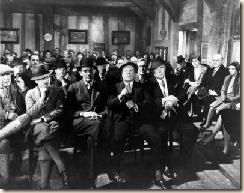(1931)
Directed by Alfred Hitchcock
Written by Alfred Hitchcock and Alma Revelle, based on a play by John Galsworthy
Starring C.V. France, Edmund Gwenn, Helen Haye, Phylis Constam, Edward Chapman, John Longden
The director hated it. The deadly scandal that leads to tragedy wouldn't raise a shrug today. The class assumptions made little sense in the US then, and probably not even in England now. And, despite the fact it's mentioned a couple of times, the meaning of the title is hard to figure out.
But The Skin Game is a surprisingly good film.
Alfred Hitchcock directed, from a John Galsworthy play. It was clearly not his type of film: no suspense, little action, a mystery throughout most of it (Hitchcock always preferred suspense to mystery*).
But the original stage play has a lot going for it.
It's the story of old money vs. new money. The Hillcrists have owned land in their town for generations and the head of the family, John Hillcrist (C. V. France), thinks of himself as a man who is upholding traditional values (and -- in modern terms, the environmentalist). The Hornblowers (led by Edmund Gwenn, an actor I always like) are the owners of a pottery works, and are buying up land in order to expand their factory and destroy the land.
Hornblower is cocky and sure of himself, a self-made man who knows what he wants and will do whatever is necessary to get it. He wants a particular tract of land, partly for practical purposes, but also because Hillcrist snubs him for being common. The land goes up for auction, and the problem escalates.
But Hornblower's daughter-in-law Chloe (Phyllis Konstam) has a dark secret in her past. Mrs. Hillcrist (Helen Haye) gets wind of it from their sleezy agent Dawker (Edward Chapman) and uses it to get what they want. But the result is tragic.
Hitchcock complained  about the actors, but, really, I've never seen Edmund Gwenn (who I've written about elsewhere) put in a bad performance. He brings some nice depth to Hornblower, who starts out as a crude and uncaring land developer but who is slowly revealed to be a decent man who wants what's best for his family and, ultimately, the community.
about the actors, but, really, I've never seen Edmund Gwenn (who I've written about elsewhere) put in a bad performance. He brings some nice depth to Hornblower, who starts out as a crude and uncaring land developer but who is slowly revealed to be a decent man who wants what's best for his family and, ultimately, the community.
France is decent as Hillcrist, but the real villain in the piece is Helen Haye's** Amy Hilcrist. She is the class system at its worst, vicious to those who cross her, and perfectly willing to toss another person's life into the meat grinder if it gives her what she wants.
But a real tour-de-force is Phyllis Konstam as Chloe. She tries her best to patch things up between the families, but her past is the ultimate wedge between them, and brutally suffers the consequences. She is a pawn, and no one is bothered that they sacrificed her for a small advantage.
There are a few Hitchcock moments. The auction scene is genuinely suspenseful, and the Hornblowers are introduced by literally doing what their name says. But it's clearly not a Hitchcock film.
Don't hold that against it. Ignore the director's name, and you'll find a surprisingly good tragedy.
*With a mystery, a solution to a puzzle is revealed; it's based upon keep things from the audience. With suspense, the plight of the characters is known to the audience -- while the characters don't realize their danger.
**Not Helen Hayes. What a difference an apostrophe makes.
No comments:
Post a Comment